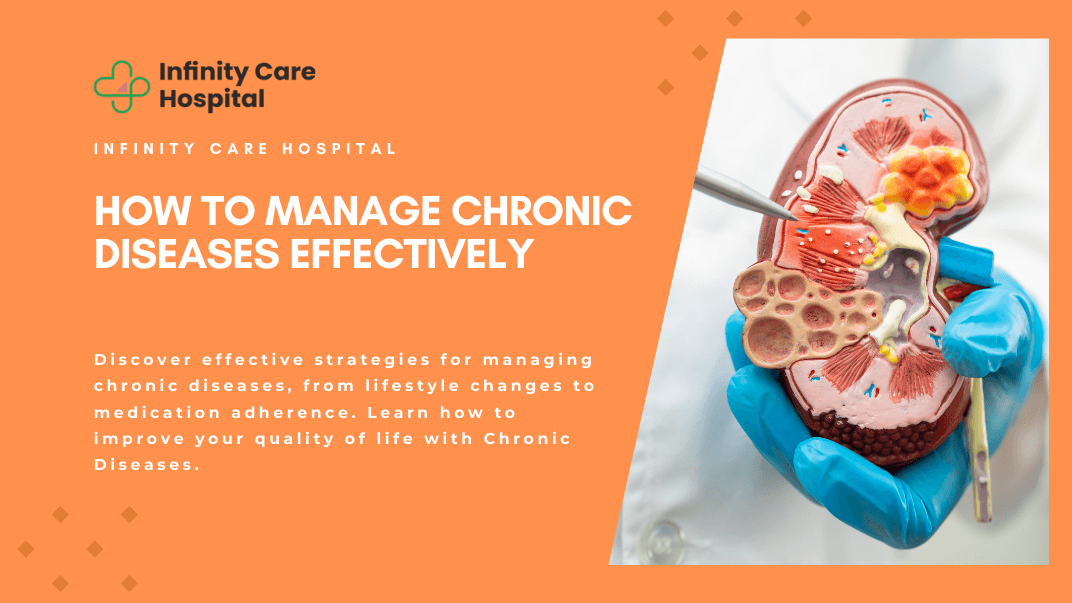Imagine a world where 80% of American adults and teens aren’t active enough. This puts them at risk for chronic illnesses that can change their daily lives. Chronic diseases like diabetes and lung diseases often need ongoing care. They can also make it hard to work and enjoy life.
Managing chronic diseases well means doing many things. This includes changing your lifestyle, handling stress, getting enough sleep, and keeping up with health check-ups. By doing these things, people with chronic conditions can feel better and handle their symptoms better.
Key Takeaways
- Chronic diseases need ongoing care and can affect daily life.
- Changing your lifestyle, like eating better and exercising, helps manage chronic diseases.
- Stress management, like mindfulness and relaxation, helps with chronic illnesses.
- Good sleep and regular health check-ups are key for managing chronic conditions.
- Sticking to treatment and having a supportive network is important for a good life with a chronic disease.
Understanding Chronic Diseases
Chronic diseases are long-lasting health conditions that need ongoing care. They can greatly affect a person’s daily life and well-being. Examples include diabetes, heart disease, arthritis, and COPD.
What Are Chronic Diseases?
These diseases have symptoms like pain, fatigue, and mood changes. They can also impact how you look, work, and your finances. Living with a chronic illness is tough due to its long-term nature and the unknown future.
Chronic diseases are the top causes of illness and death worldwide. Conditions like cancer, heart disease, and lung diseases are common. Smoking, toxic chemicals, and air pollution increase the risk of lung cancer and other respiratory diseases.
| Chronic Disease | Prevalence | Mortality Rate |
|---|---|---|
| COPD | 24 million Americans, 210 million worldwide | Third leading cause of death in the U.S. |
| Lung Cancer | – | – |
| Cardiovascular Disease | – | – |
Chronic diseases cause a lot of deaths globally, with 38 million deaths each year from non-communicable diseases. In the U.S., 40% of adults have two or more chronic conditions. Most healthcare costs come from these diseases and unhealthy behaviors.
“Chronic diseases are characterized by complex causes, risk factors related to lifestyle, long latency periods, long durations of illness, functional impairments, and specific disabilities.”
Chronic illnesses deeply affect a person’s quality of life. Adults with these conditions often feel less satisfied with life. Children with chronic illnesses are more likely to have mental health issues than healthy kids.
Lifestyle Modifications for Chronic Disease Management
Making changes in our lifestyle is key to handling chronic diseases. By changing our diet and exercising regularly, we can greatly boost our health. This leads to better control over chronic conditions.
Diet Adjustments
Eating a diet full of fruits, veggies, whole grains, and lean meats can really help with chronic diseases. Cutting down on processed foods and drinking plenty of water also helps. Doctors can give us diet plans that fit our chronic conditions, making it easier to manage our health.
Regular Exercise
Even low-impact exercise can be a big help for people with chronic diseases. It can boost energy, ease pain, and improve health. The Department of Health and Human Services suggests doing at least 150 minutes of moderate or 75 minutes of vigorous exercise each week. Doctors can help pick the right exercise plan for you.
By making these lifestyle changes, we can take charge of our chronic diseases. Eating well and exercising regularly can make life better, lower the risk of problems, and lead to better health.
| Lifestyle Change | Benefits for Chronic Disease Management |
|---|---|
| Consuming a colorful, balanced diet | Improved nutrient intake, better disease management |
| Reducing processed foods | Decreased intake of unhealthy additives and preservatives |
| Staying hydrated | Supports overall bodily functions and well-being |
| Engaging in regular physical activity | Increased energy, pain management, and improved overall health |
“Lifestyle modifications are essential for managing and preventing chronic diseases. By making changes to our diet and incorporating regular exercise, we can take an active role in improving our health and well-being.”
Chronic Diseases
Chronic diseases like heart disease, cancer, and diabetes are top causes of death and disability globally. They deeply affect a person’s health, feelings, and social life. These conditions bring on tough symptoms and big changes in life.
Chronic diseases don’t go away easily. They need ongoing care and can make daily tasks hard. This can affect someone’s job, money matters, and family life. Families also face big challenges as they adjust to their loved ones’ needs.
Chronic diseases show both visible and hidden signs. Some have clear physical signs, like weight changes or skin issues. But many also have hidden symptoms like chronic pain, tiredness, and mood changes. These hidden signs can be hard to see and understand, making it tough to get the right support.
Chronic diseases can also lead to other health problems, called comorbidities. For example, heart disease might make someone more likely to get depression or anxiety. These extra conditions make managing chronic diseases harder, needing a more detailed healthcare plan.
To tackle chronic diseases, we need a plan that looks at their physical, emotional, and social sides. By understanding these diseases well and using good management plans, people and doctors can improve life quality for those affected. This helps lessen the big health issues these conditions bring.
Stress Management Techniques
Living with chronic diseases can be stressful, leading to anxiety and depression. It’s key to manage this stress well to keep a good quality of life. Luckily, there are many ways to handle stress for those with chronic conditions.
Mindfulness and Relaxation Practices
Mindfulness means being fully in the moment. It’s a great way to reduce stress. Mindfulness-Based Stress Reduction (MBSR) programs teach things like the “body scan,” yoga, and meditation. These can help with stress and improve how you feel.
There are also other ways to relax and find peace. Things like yawning exercises and the 4-7-8 breathing can help. They make you feel less stressed and more aware.
“Trait mindfulness has been associated with better physical health, fewer physiological symptoms like pain, and decreased healthcare resource utilization.”
Adding mindfulness and relaxation to your daily life can really help with stress from chronic diseases. It helps you understand yourself better and manage your feelings. This can make life easier and better overall.
| Stress Management Technique | Benefits |
|---|---|
| Mindfulness-Based Stress Reduction (MBSR) | Reduces physiological dysregulation, improves psychological well-being |
| Conscious Yawning Exercises | Reduces stress, increases relaxation, promotes cognitive awareness |
| 4-7-8 Breathing Method | Reduces stress, increases relaxation, promotes cognitive awareness |
Using these stress management methods can help people with chronic diseases take charge of their health. It lets them deal with challenges better and improve their well-being.
The Importance of Adequate Sleep
Adequate sleep is key for handling chronic diseases. During sleep, the body repairs and heals itself. This is vital for people with chronic conditions. Good sleep helps improve health and manage chronic illnesses better.
About 1 in 3 adults in the U.S. say they don’t get enough sleep daily. Nearly 40% of adults fall asleep during the day without wanting to at least once a month. Not getting enough sleep is linked to heart disease, kidney disease, high blood pressure, diabetes, stroke, obesity, and depression.
To get enough sleep and help manage chronic diseases, it’s important to have a regular sleep routine. Keep your sleeping area calm and comfy. Also, cut down on screen time before bed. These steps can improve sleep quality and overall health.
Strategies for Improving Sleep Quality
- Establish a consistent bedtime and wake-up schedule, even on weekends.
- Create a relaxing bedtime routine, such as taking a warm bath or practicing gentle stretching.
- Ensure the sleeping environment is dark, quiet, and cool, which can help facilitate better sleep.
- Limit the use of electronic devices, such as smartphones, tablets, and computers, at least an hour before bedtime.
- Engage in regular physical activity during the day, but avoid intense exercise close to bedtime.
- Avoid consuming caffeine, nicotine, and heavy meals close to bedtime.
By using these strategies and focusing on sleep, people with chronic diseases can support their health and well-being. Quality sleep is key for healing and recovery. It’s a vital part of managing chronic diseases.
Regular Health Check-ups
Keeping up with health is a lifelong journey. Regular health check-ups are key to managing chronic diseases well. They let doctors keep an eye on your health, spot problems early, and tweak treatment plans as needed.
Monitoring and Adjusting Treatment Plans
Sticking to medical appointments and treatment plans helps people with chronic conditions. It helps manage symptoms, prevent problems, and keep life quality high. For those under 50 in good health, check-ups are needed every 3 years.
After 50, yearly check-ups are a must. Those with chronic diseases should visit more often, no matter their age.
Regular check-ups can catch serious health issues early. Early treatment during these visits can greatly improve health. They also help spot and fix any changes in your health quickly.
Some tests and exams are needed based on your age, gender, and health risks. Women of childbearing age should get checked for intimate partner violence. Men 65 to 75 with a smoking history should get screened for abdominal aortic aneurysm.
By making health check-ups a priority, you can take charge of your chronic diseases. You’ll get the most from your treatment plans. And you’ll catch and keep an eye on health issues early.
Treatment Adherence and Consistency
Keeping up with treatment adherence and consistency is key for managing chronic diseases. This means taking your meds as told, doing exercises, and following self-care steps. Using strategies to stay on track can greatly improve health and disease management.
Strategies for Staying on Track
Making the treatment plan simpler can really help with medication adherence. Fewer medications or steps make it easier to stick with self-care strategies. Reminders like alarms, calendars, or apps can also help you remember to take your meds or do important tasks.
Keeping track of your progress is another good idea. Watching for symptom changes, blood pressure, or when you need more meds can motivate you. Working closely with your doctor is important too. They can tweak your plan and help overcome treatment adherence hurdles.
“Approximately 5 to 11% of hospital admissions are due to medication nonadherence.”
Studies show that being consistent with your treatment leads to better health and disease control. For example, a 2001 study by Lorig et al. found that a self-management program helped people with chronic diseases for two years.
By using these strategies and sticking with treatment adherence, people with chronic conditions can better manage their health. Regular self-care and working with healthcare providers are vital for chronic disease management.
Building a Support System
Living with a chronic disease can feel overwhelming. But, having a strong support system can change everything. Working with healthcare providers and getting help from family, friends, and groups can make a big difference.
Collaborating with Healthcare Providers
It’s key to have a good relationship with healthcare providers when you’re managing a chronic disease. By working with your care team, you can make sure your treatment fits your needs. This means you can adjust things as needed.
Regular talks and teamwork with healthcare pros can make care better. It can lead to better health and outcomes.
People with a strong support system are 30% more likely to follow their treatment plans. They are also 25% less likely to feel lonely because of their health.
Support groups are great for people with chronic illnesses. Being in a group can cut the risk of feeling depressed by up to 40%. About 70% of people with chronic diseases feel better about their health after connecting with supportive people.
Managing a chronic illness better means staying social. Being in a support group or volunteering can lower anxiety and stress by 20%. Social support networks offer comfort, reduce stress, and boost mental health.
Friends and family can push you to stick to your treatment and live healthier. They share info, resources, and help with managing your condition. With a strong support system, you can take control of your health and make smart choices about your care.
Self-Care and Quality of Life
Living with a chronic disease means focusing on a good quality of life. Self-care is key, helping people manage their health and happiness. It’s about taking charge of your physical, emotional, and social health.
Stress Management Techniques: Chronic diseases can be hard on the mind and heart. That’s why managing stress is important. Activities like mindfulness, deep breathing, or yoga can help. They make stress go down and bring calmness.
Engaging in Enjoyable Activities: Doing things you love can make you feel better. This could be hobbies, being with friends, or just enjoying quiet time. Adding these activities to your day can make life more balanced and fulfilling.
Prioritizing Overall Well-Being: Living with a chronic disease might mean eating better, exercising, and sleeping well. These changes are hard but necessary. They help manage symptoms and keep you healthy.
By focusing on self-care, people with chronic diseases can handle their health better. This approach improves their life quality and makes them feel more in control. It leads to better health, more strength, and empowerment.
Conclusion
Managing chronic diseases needs a mix of Chronic Disease Management, Effective Strategies, Lifestyle Changes, Healthcare Collaboration, and focusing on Quality of Life. Making lifestyle changes, managing stress, getting enough sleep, and sticking to health advice helps. This way, people with chronic conditions can handle their symptoms better, avoid complications, and feel better overall.
Working closely with doctors and taking care of yourself is key when dealing with chronic diseases. This approach lets patients take charge of their health and aim for a better Quality of Life. By using Effective Strategies and working together with healthcare teams, people can handle the challenges of Chronic Disease Management and live better.
Handling chronic diseases is a long-term effort that needs a focus on the patient, constant effort, and a commitment to Lifestyle Changes and self-care. By helping people take charge of their health, doctors can help them reach their health goals and boost their Quality of Life.
FAQ
What are chronic diseases?
Chronic diseases are health issues that last over a year and need ongoing care. They can greatly affect daily life and activities. Examples include diabetes, heart disease, arthritis, and COPD.
How can lifestyle modifications help manage chronic diseases?
Changing one’s lifestyle is key to managing chronic diseases. Eating right, exercising regularly, and managing stress can help. These changes improve symptoms, energy, and health outcomes.
What is the impact of chronic diseases on an individual’s well-being?
Chronic diseases affect a person’s physical, emotional, and social health. They bring symptoms like pain and fatigue. These conditions can also change how someone sees themselves and affects work and money.
How can stress management techniques help individuals with chronic diseases?
Managing stress is crucial for those with chronic diseases. Techniques like a positive environment and mindfulness help. They aid in dealing with the challenges of chronic conditions.
Why is adequate sleep important for managing chronic diseases?
Good sleep is key for managing chronic diseases. Sleep helps the body repair and heal. A consistent sleep routine and a calm sleep environment improve sleep quality and health.
How can regular health check-ups benefit individuals with chronic diseases?
Regular health check-ups are crucial for chronic disease management. They help monitor conditions, catch changes early, and adjust treatments. Staying with medical appointments and treatments helps manage symptoms and prevent complications.
What strategies can help individuals maintain treatment adherence and consistency?
Staying on track with treatment is key for chronic disease management. Strategies include simplifying treatment plans, using reminders, tracking progress, and working with healthcare providers. Following the treatment plan consistently leads to better disease management and health.
Why is building a strong support system important for individuals with chronic diseases?
A strong support system is vital for those with chronic diseases. It includes family, friends, support groups, and healthcare providers. This support improves emotional, practical, and social well-being, enhancing life quality with chronic conditions.
How can self-care impact the quality of life for individuals with chronic diseases?
Self-care is crucial for a good life with chronic diseases. It involves stress management, enjoyable activities, and focusing on well-being. Addressing physical, emotional, and social needs helps individuals cope better and improve their life quality.




